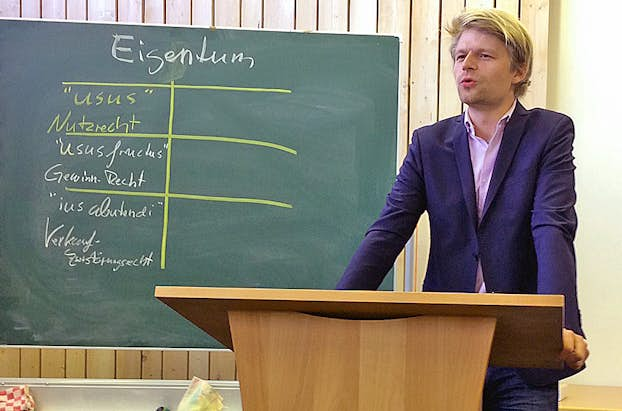- News
OIKOPOLIS am Dialog: Who owns corporations?
On the 23rd of April, Armin Steuernagel, co-founder of the charity Purpose, was invited by “OIKOPOLIS am Dialog” as a guest speaker.
The topic of his speech was “who owns corporations”. He explained which alternative property structures could guarantee the survival of SME’s from a hostile takeover of MNE’s in the long term.
Nowadays, the fact that companies do not own themselves anymore, but are being used as profit-generating instruments from large corporation is problematic. The focus on profits happens at the cost of the working society and nature. In these cases, external managers who have never even entered a company decide over their future and give action advises. This leads to a situation, where decision- and action taking are separated and the passion is missing. The consequence is that employees lose their motivation, are dissatisfied and act passively. The company does not live anymore, it only functions for the sake of its shareholders.
Many organic pioneer farms have already been taken over by some big multinationals, such as Söbbeke Pauls organic diary plant, LOGONA, Provamel, and Pukka Herbs. This development worries many companies. Their initial mission was to create something useful for the world and not to enrich the capital of external holding companies. Armin Steuernagel promotes his goal that a meaningful corporate idea survives in the long run, with the people active in the company deciding and not the investors and shareholders.
Appeal for the introduction of a “property of responsibility”
One possibility to save a company from a hostile takeover is to declare it as a property of responsibility, which makes it impossible to inherit or sell the firm. According to Steuernagel, the company should be transferred to capable people who feel responsible for it and its employees, who share the same values and who see corporate management as a challenge.
The profits of the company should not only be redistributed as dividends, but should also guarantee a fair remuneration to the employees and a repayment to the investors and contribute to the corporate development through reinvestments. People in the decision-making process should not be considered for the redistribution of profits in order to keep the focus on the social purpose and to prevent solely economic reasons for the decisions taken.
Successful companies like Bosch, Bertelsmann and Waschbär have been organised for many years as trust companies or foundations. They can thus stay loyal to their values and do not need to push the return on investment to extreme heights, while endangering their future.

